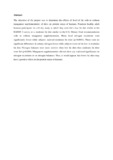| dc.contributor.author | Kandiah, J. | |
| dc.contributor.author | Tuitoek, Prisca J. | |
| dc.contributor.author | Kies, C. | |
| dc.date.accessioned | 2017-08-31T13:27:47Z | |
| dc.date.available | 2017-08-31T13:27:47Z | |
| dc.date.issued | 1996-01 | |
| dc.identifier.citation | Nutrition Research Volume 16, Issue 1, January 1996, Pages 33-40 | en_US |
| dc.identifier.uri | http://www.sciencedirect.com/science/article/pii/0271531795020578 | |
| dc.identifier.uri | http://hdl.handle.net/123456789/2769 | |
| dc.identifier.uri | https://doi.org/10.1016/0271-5317(95)02057-8 | |
| dc.description | https://doi.org/10.1016/0271-5317(95)02057-8 | en_US |
| dc.description.abstract | The objective of the project was to determine the effects of level of fat with or without manganese supplementation of diets on protein status of humans. Fourteen healthy adult humans participated in a 61 day study in which they were fed a low fat diet similar to the HANES I survey or a moderate fat diet similar to the U.S. Dietary Goal recommendation with or without manganese supplementation. Mean fecal nitrogen excretions were significantly lower while subjects received moderate fat diets (p<0.0001). There were no significant differences in urinary nitrogen losses while subjects received the low or moderate fat diet. Nitrogen balances were more positive when low fat diets then moderate fat diets were fed (p<0.004). Manganese supplementation did not show any statistical significance on nitrogen excretions or on nitrogen balances. Thus, it would appear that lower fat diets may have a positive effect on the protein status of humans. | en_US |
| dc.language.iso | en | en_US |
| dc.publisher | Elsivier | en_US |
| dc.subject | Fat | en_US |
| dc.subject | Manganese | en_US |
| dc.subject | Protein | en_US |
| dc.subject | Nitrogen | en_US |
| dc.subject | Cholesterol | en_US |
| dc.title | Protein utilization in humans as affected by level of dietary fat | en_US |
| dc.type | Article | en_US |

